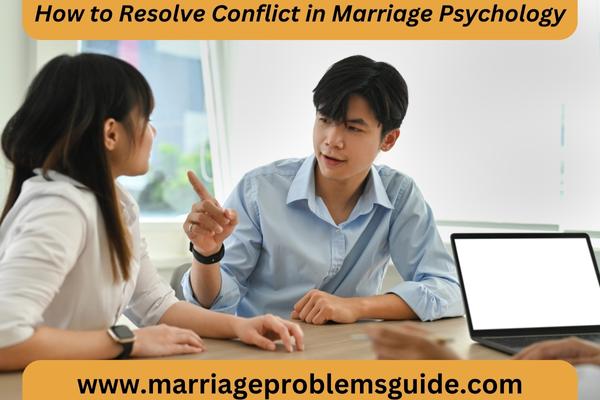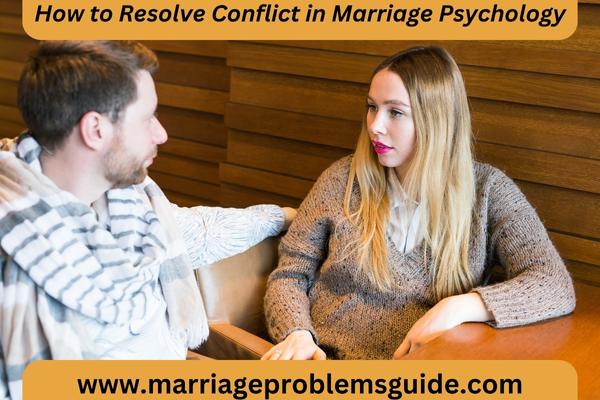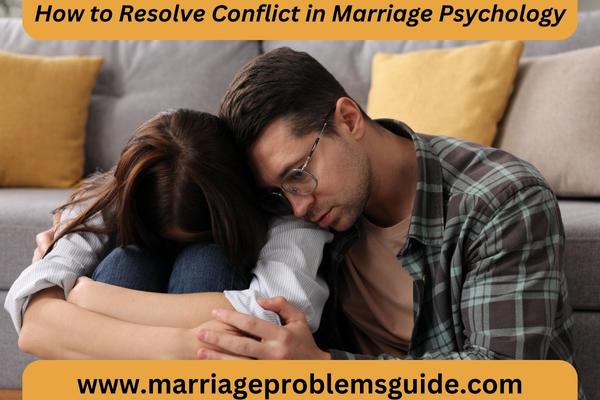Resolve Conflict in Marriage Psychology
Marriage brings two individuals together to form a lifelong bond, blending two separate lives into one shared journey. However, no two people are exactly alike – partners inevitably have differences that can lead to disagreements and conflict.
If left unresolved, frequent conflict can slowly corrode the foundation of trust, respect and intimacy that a marriage is built upon.
The good news is, that psychological research shows that with some effort and communication skills, many marital conflicts can be worked through to reach mutual understanding.
By understanding the common roots of marital disputes and learning constructive conflict resolution techniques, couples can overcome obstacles and maintain a loving relationship.
Common Causes of Marital Conflict
Before attempting to resolve disagreements with your spouse, it helps to understand what’s triggering arguments in the first place. Some common causes of marital conflict include:
- Differing communication styles – Partners may have different habits and needs when it comes to communication frequency, listening behaviours, expressing affection or raising concerns. Mismatched communication patterns can lead to tension.
- Financial Pressures – Money-related issues like debt, spending habits, financial priorities or income imbalances are notorious spark points for marital arguments.
- Uneven division of household duties – Conflict can arise when there are differences in standards of household cleanliness or one partner feels the other isn’t pulling their weight with chores and childcare duties.
- Intimacy issues – Discrepancies in sexual needs, mismatched libidos, or emotions like resentment or disconnection can diminish intimacy over time, causing strife in the relationship.
- In-law issues – Tension with a spouse’s family members, differences over how much time to spend with extended relatives, or conflicts between parenting styles can stir up marital disputes.
- Stress spillover – High external stress from work, health issues or other life challenges can heighten emotional reactivity at home, causing partners to be more sensitive and argumentative.

Constructive Conflict Resolution Techniques
Dr. John Gottman, a marriage researcher and couples therapist, found that stable, satisfied marriages have a 5:1 “magic ratio” – for every negative interaction during conflict, five or more positive interactions are needed to balance things out.
With some psychological techniques, couples can navigate disagreements in a more constructive, uplifting way. Useful strategies include:
- Compromise – Finding a middle ground with give-and-take negotiating helps partners make joint decisions incorporating both perspectives. Compromising demonstrates a willingness to understand a spouse’s position.
- “I” Statements – Using “I feel…” statements avoid putting the blame on a partner, allowing each individual to express their own emotional experience and needs non-critically. This invites empathy and collaboration in solving the issue.
- Active Listening – When a partner shares difficult feelings, the listener should try to fully understand their perspective before responding, paraphrasing back what they heard. Actively listening without judgment or defensiveness diffuses tension.
- Take breaks when needed – If communication breaks down into destructive fighting during a heated conflict, it’s okay to pause temporarily by taking space to regain composure before reengaging.
- Don’t hold grudges – Rehashing old arguments or harbouring resentment over past issues impedes resolving current disputes. Couples should grant each other grace by focusing conflict discussions on the situation at hand.
- Seek outside support if needed – For recurring conflicts that partners can’t seem to work through independently, seeking counselling builds conflict management skills. Therapists help identify communication blockades and design an action plan.

Overcoming Common Roadblocks to Conflict Resolution
Even well-intentioned spouses can encounter roadblocks that stand in the way of working through disagreements effectively.
By understanding the psychology behind counterproductive conflict behaviours, couples can catch themselves and readjust their approach as needed.
Common roadblocks include:
- Defensiveness – When one partner immediately reacts to critiques or difficult feedback by making excuses, denying responsibility, reversing blame onto the other, or passive-aggressively withdrawing from the conversation, it shuts down progress on mutual problem-solving.
- Criticism & Contempt – Resorting to hurtful personal attacks, mockery, hostile sarcasm or judgmental labels erodes the security needed for open communication during conflict resolution. It signals disrespect.
- Stonewalling – Emotionally withdrawing from an argument by refusing to respond or engage, acting indifferent, or distancing yourself for extended periods blocks communication. It also prevents understanding a partner’s perspective.
- Flooding – Feeling so emotionally overwhelmed by marital tensions that it impairs thinking clearly and communicating logically. Flooding stirs up destructive fight-or-flight reactions rather than reconciliation.
To avoid these unproductive dynamics, it’s important to remain aware of inner thoughts and feelings during arguments, pause when needed to regain composure, and then reenter the discussion with poise once any activated anger, pride or insecurity settles down.
Partners should also avoid criticizing each other’s personalities altogether, strictly focusing feedback on the situational behaviour itself.
Comments like “When you forgot our date night for the third week in a row, it made me feel neglected in this relationship” open more healthy dialogue than “You are so selfish and make me feel insignificant.” Direct issue-focused statements steer clear of attacking character or assigning blame.

Tips for Managing Ongoing Marital Conflicts
Despite best efforts, some marital disputes seem resistant to quick fixes or keep reemerging over time, even after attempts to resolve them. This ongoing conflict takes a heavy toll emotionally.
For chronically strained marriages going through recurring arguments, therapists emphasize consistency – keep applying healthy conflict resolution techniques together, no matter how endless or drained the feud feels in the moment. Don’t let frustration deter persistence.
Other recommendations include:
- Pinpoint Triggers: Keep a log of when, where and why certain disputes happen so you can spot patterns and avoid or better manage triggers
- Don’t Avoid Conflict Entirely: While frequent arguing signals bigger issues, conflict is natural and some tension-airing conversations are needed to nurture intimacy, trust and understanding over time.
- Strengthen Positive Connections: Make extra efforts to schedule quality time together doing activities you both enjoy. Focus conversations on expressing gratitude, affection and praise for each other’s admirable qualities and actions, creating at least a few uplifting interactions for every disgruntling fight.
At the end of the day, what matters most is that both partners share a willingness and commitment to hear each other out with openness, respect and care so problems can be addressed as a team.
While some marital conflicts may never fully disappear, understanding patterns of disagreement and nurturing intimacy through them will help sustain the marital bond.
The key is to tackle issues before resentment sets in too deeply, make conflict resolution a regular relationship check-in, and remain focused on “we” instead of “me” or “you”.
With some psychological tools for constructive arguing and radical acceptance of a partner’s differences, many recurring spousal disputes can ultimately be dissolved.


